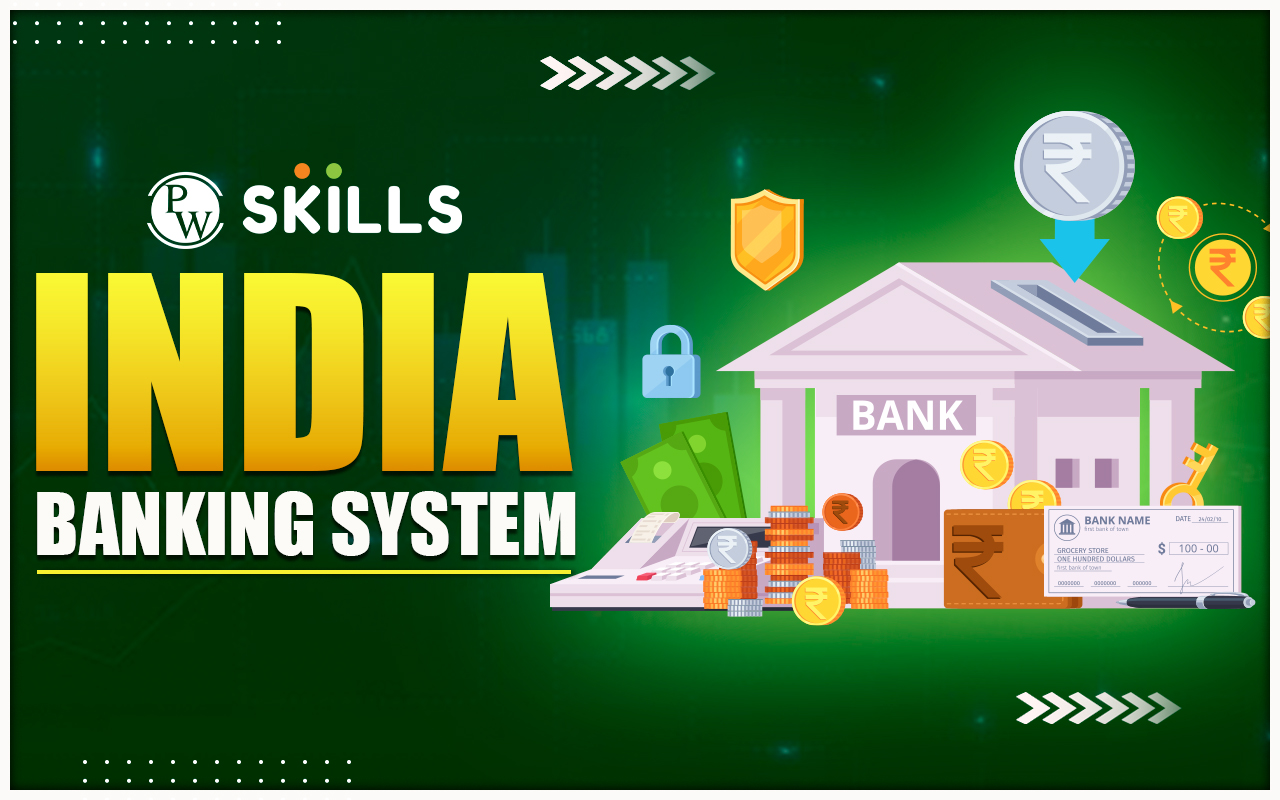Banking System In India: Banking contains a network of financial entities such as banks and credit unions. The banking system in India offers diverse financial services to individuals, businesses, and governments. These services primarily involve accepting deposits, lending funds, facilitating transactions and providing various financial products like savings accounts, loans, and credit cards.
The banking system in India is a fundamental pillar within the financial landscape, crucial for the economy’s functionality. Effectively managing a country’s trade, industrial, and agricultural financial requirements is important for its economic progress. Consequently, a nation’s advancement is deeply intertwined with the evolution of its Indian banking sector.

Banking System in India Overview
In the modern economy, banks should be seen as development agents rather than financial intermediaries. The banking system in India holds a pivotal role in gathering deposits and distributing credit across numerous sectors of the economy.
India’s banking system, consisting of the Reserve Bank of India (RBI), commercial banks, cooperative banks, and development finance institutions, forms the core of the country’s financial framework. The banking system in India serves as a pivotal platform where savers and investors converge. Banks significantly contribute to the development of underprivileged nations by mobilising and effectively allocating resources.
Also read: An Overview of the Indian Banking Sector and its Evolution
Private Banking System in India
Private banking involves establishing a personalised and close relationship between a high-net-worth individual or ultra-high-net-worth individual (client) and a dedicated private banker. The process typically involves an in-depth consultation to grasp the client’s financial goals, risk tolerance, and specific requirements. Subsequently, the private banker formulates a bespoke wealth management plan offering investment strategies, asset allocation, and other tailored financial solutions.
Private banking services go beyond conventional banking, offering exclusive product access, specialised lending options, and custom financial solutions. The overarching objective is to deliver comprehensive financial management, aiding clients in growing and preserving their wealth while aligning with their distinct objectives.
Types of Banks in India
The banking system in India is very flexible, and the banks are categorised into different categories. The banks are categorised into Central banks, Commercial banks, cooperative banks, Payment banks etc. Go through the section below to know about the types of banks in India.
Central Bank
The Reserve Bank of India (RBI) serves as the country’s Central Bank, regulating and controlling the monetary and banking system.
Commercial Banks
- Commercial Banks: These include public sector banks, private sector banks, foreign banks, and regional rural banks catering to diverse financial needs.
- Public Sector Banks: The government owns and operates these banks. Examples include the State Bank of India (SBI), Punjab National Bank (PNB), and Bank of Baroda (BOB).
- Private Sector Banks: These banks are privately owned and managed. Notable examples include HDFC Bank, ICICI Bank, and Axis Bank.
- Foreign Banks: These banks originate in foreign countries and operate branches within India. Examples include Citibank, Standard Chartered, and HSBC.
- Regional Rural Banks (RRBs): These banks serve rural and semi-urban areas. They are owned by the government, commercial banks, and state governments.
| Public Sector Banks | Private Sector Banks | Foreign Banks |
| Bank of Maharashtra | ICICI Bank | Australia and New Zealand Banking Group Ltd. |
| Indian Bank | RBL Bank | National Australia Bank |
| Bank of Baroda | IDFC Bank | Westpac Banking Corporation |
| Canara Bank | South Indian Bank | Bank of Bahrain & Kuwait BSC |
| State Bank of India | IDBI Bank | AB Bank Ltd. |
| Central Bank of India | Tamilnad Mercantile Bank | Credit Agricole Corporate & Investment Bank |
| Union Bank of India | YES Bank | Societe Generale |
| Indian Overseas Bank | Axis Bank | Deutsche Bank |
| UCO Bank | City Union Bank | HSBC Bank |
| Punjab & Sind Bank | Karnataka Bank | PT Bank Maybank Indonesia TBK |
| Bank of India | Dhanlaxmi Bank | Mizuho Bank Ltd. |
| Punjab National Bank | Kotak Mahindra Bank | Sumitomo Mitsui Banking Corporation |
| DCB Bank | MUFG Bank, Ltd. | |
| Karur Vysya Bank | Coöperatieve Rabobank U.A. | |
| Federal Bank | Sonali Bank Ltd. | |
| Lakshmi Vilas Bank | Bank of Nova Scotia | |
| HDFC Bank | Industrial & Commercial Bank of China Ltd. | |
| Nainital Bank | BNP Paribas | |
| IndusInd Bank | Doha Bank Q.P.S.C. | |
| Bandhan Bank | Qatar National Bank (Q.P.S.C.) | |
| Jammu and Kashmir Bank | JSC VTB Bank | |
| Sberbank | ||
| United Overseas Bank Ltd | ||
| FirstRand Bank Ltd | ||
| Shinhan Bank | ||
| Woori Bank | ||
| Barclays Bank Plc. | ||
| Standard Chartered Bank | ||
| The Royal Bank of Scotland plc | ||
| American Express Banking Corporation | ||
| Bank of America | ||
| Citibank | ||
| J.P. Morgan Chase Bank N.A | ||
| Kookmin Bank | ||
| SBM Bank (India) Limited | ||
| KEB Hana Bank | ||
| Industrial Bank of Korea | ||
| Bank of Ceylon | ||
| DBS Bank India Limited | ||
| Credit Suisse AG | ||
| CTBC Bank Co., Ltd. | ||
| Krung Thai Bank Public Co. Ltd. | ||
| Abu Dhabi Commercial Bank Ltd. | ||
| Mashreq Bank P.S.C. | ||
| First Abu Dhabi Bank P.J.S.C. | ||
| Emirates Bank NBD |
Cooperative Banks
Registered under the Co-operative Societies Act, they serve urban and rural areas, primarily focusing on smaller borrowers and agriculture-based activities.
- State Co-operative Banks are guardians of a state’s cooperative banking system. They operate as a federation comprising central Co-operative banks.
- Urban Co-operative Banks, located primarily in urban and semi-urban areas, are the main Co-operative banks. These banks primarily extend loans to smaller borrowers and support businesses around specific communities or localities.
Also read: Is Banking A Good Career Options In 2024?
Payment Banks
A newer banking model authorized by the RBI to accept restricted deposits up to Rs. 1 lakh per customer and provide services like ATM cards and net banking.
Small Finance Banks
These banks aim to serve unserved and underserved sections of the population, including small businesses and low-income individuals. Here are a few examples of small finance banks in India that have been growing rapidly.
- AU Small Finance Bank Ltd.
- Utkarsh Small Finance Bank Ltd.
- Fincare Small Finance Bank Ltd.
- Ujjivan Small Finance Bank Ltd.
- Jana Small Finance Bank Ltd.
- ESAF Small Finance Bank Ltd.
- Suryoday Small Finance Bank Ltd.
- Equitas Small Finance Bank Ltd.
- Capital Small Finance Bank Ltd.
- North East Small Finance Bank Ltd.
Scheduled and Non-Scheduled Banks
Scheduled banks listed under RBI’s 2nd Schedule, require a paid-up capital of Rs. 5 lakhs or more, while non-scheduled banks are local area banks not listed under the schedule.
Type Of Bank Account
Additionally, the banking system in India offers various types of bank accounts to meet diverse financial requirements. These accounts vary in purpose, transaction frequency, and location, catering to different financial needs.
- Savings Account
- Current Account
- Fixed Deposit Account
- Recurring Deposit Account
- NRI Account (NRE, NRO, FCNR)
- Senior Citizen Savings Account
- Salary Account
- Demat Account
- Joint Account
- Minor Account
- Corporate Account
Various Aspects Of Banking System in India
A private banker is a financial professional responsible for overseeing the financial affairs and investments of high-net-worth individuals and organisations. These professionals offer tailored financial services, including asset management, estate planning, and tax guidance. Additionally, the banking system in India offers services such as providing loans, and lines of credit, and facilitating access to private equity and venture capital investments.
- Banking Services: This involves opening and managing accounts, facilitating direct deposits, and offering investment guidance.
- Financial Planning Services: Private bankers can help clients establish budgets, create emergency funds, and plan for retirement.
- Investment Services: Private bankers are equipped to manage investment portfolios, conduct stock research, and diversify investment portfolios.
- Advice on Mortgages, Loans, and Insurance Products: They provide guidance and recommendations on mortgage options, loans, and insurance products.
- Assistance with Tax Preparation and Filing: Private bankers offer support in preparing and filing taxes, ensuring compliance with relevant regulations.
- Estate Planning and Trusts: They assist in developing strategies for estate planning and managing trusts.
- Concierge Services: Private bankers may extend personalized services such as travel planning, event coordination, and lifestyle management.
Also read: Best Certificate Courses in Banking 2024, Placement, and Fee
Functions Of the Indian Private Banking System
The banking system in India caters to diverse financial needs, providing services such as savings and checking accounts, loans (including personal, business, and mortgages), credit cards, investment opportunities, and electronic banking options like online and mobile banking. Below are some key functions that the banking system in India fulfills:
- Accepting Deposits: Banks serve as secure repositories for individuals and businesses, offering a safe place to deposit funds with easy access when needed.
- Providing Loans: Banks offer financial assistance to individuals and businesses for various purposes, including home mortgages, business expansions, and personal loans.
- Facilitating Payments and Settlements: Banks facilitate transactions through various payment methods, such as checks, debit/credit cards, and electronic transfers.
- Currency Exchange: Many banks provide foreign exchange services, allowing customers to buy, sell, or convert foreign currencies.
- Safekeeping of Valuables: Some banks offer secure safe deposit boxes for customers to store valuable items and important documents.
- Investment Services: Banks also present investment opportunities like mutual funds, stocks, and bonds, helping customers grow their wealth.
- Internet Banking Services: Banks provide online and mobile banking facilities, offering convenience for customers to manage accounts, pay bills, and conduct fund transfers.
How Does Private Banking Work?
Private banking involves establishing a close and personalised relationship between a high-net-worth individual or ultra-high-net-worth individual (client) and a dedicated private banker. The process typically commences with a thorough consultation to grasp the client’s financial goals, risk tolerance, and specific needs. Subsequently, the private banking system in India devises a personalised wealth management plan encompassing investment strategies, asset allocation, and other financial solutions.
Private banking services go beyond conventional banking, offering exclusive products, specialised lending, and tailored financial solutions. The overall objective of the banking system in India is to deliver comprehensive financial management that aids clients in growing and safeguarding their wealth.
Also read: Career in Banking 2024: Jobs, Salary, How to Start?
Top 10 Private Banks in India 2023
| Bank Name | Total Branches | Total ATMs | Headquarters City |
| HDFC Bank | 6,342 | 18,130 | Mumbai |
| ICICI Bank | 5,275 | 15,589 | Mumbai |
| Axis Bank | 4,758 | 10,990 | Mumbai |
| Kotak Mahindra Bank | 1,600 | 2,519 | Mumbai |
| IndusInd Bank | 2,015 | 2,886 | Pune |
| Yes Bank | 1,000+ | 1,800 | Mumbai |
| Federal Bank | 1,282 | 1,885 | Aluva |
| RBL Bank | 502 | 414 | Mumbai |
| J&K Bank | 964 | 1,388 | Srinagar |
| South Indian Bank | 933 | 1,200+ | Thrissur |
FAQs
How is the Indian banking sector structured?
The Indian banking sector is broadly categorized into scheduled banks and non-scheduled banks.
Who oversees the Indian banking system?
The regulation of the banking industry in India falls under the purview of the Reserve Bank of India, serving its role as the country's central bank.
What is the functioning of private banking?
Private banking is an exclusive service tailored for high-net-worth individuals (HNWIs). It entails personalized financial and investment services and products a dedicated personal banker provides.
Why are private sector banks significant?
Private sector banks play a crucial role by offering comprehensive wealth management services. This includes personalized portfolio management, global asset allocation, and financial planning services.




